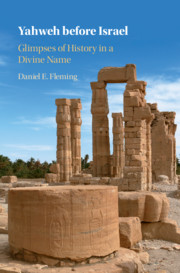Book contents
- Yahweh before Israel
- Yahweh before Israel
- Copyright page
- Dedication
- Contents
- Figures
- Preface
- Acknowledgments
- Abbreviations
- 1 Introduction
- 2 Yhwʒ of Shasu-Land
- 3 The Midianite Hypothesis
- 4 The Old Poetry
- 5 The Name Yahweh
- 6 The People of Yahweh
- 7 The Early Character of the God Yahweh
- Bibliography
- Ancient Near East Index
- Scripture Index
- Subject Index
3 - The Midianite Hypothesis
Moses and the Priest
Published online by Cambridge University Press: 17 November 2020
- Yahweh before Israel
- Yahweh before Israel
- Copyright page
- Dedication
- Contents
- Figures
- Preface
- Acknowledgments
- Abbreviations
- 1 Introduction
- 2 Yhwʒ of Shasu-Land
- 3 The Midianite Hypothesis
- 4 The Old Poetry
- 5 The Name Yahweh
- 6 The People of Yahweh
- 7 The Early Character of the God Yahweh
- Bibliography
- Ancient Near East Index
- Scripture Index
- Subject Index
Summary
In spite of its frequent application, the Egyptian evidence for Yhwʒ does not supply straightforward support for Yahweh’s origins among peoples of the wilderness south of Israel and Judah. Yhwʒ identifies a major unit of what the Egyptians confronted as a unified “Shasu-land,” a land not yet situated by Egypt in Seir and Edom. As often asserted, nevertheless, the Shasu name does appear to lie behind the deity Yahweh. When Bernhard Grdseloff (1947) discovered the Shasu list, he presented it as confirmation of an already dominant explanation for Yahweh’s origins, what I have called the Midianite Hypothesis. In order to reconsider the implications of this oldest Egyptian evidence, we must examine the Hypothesis in its larger form, and the next two chapters address the main material and arguments. The idea that Yahweh was originally a god of desert peoples from whom Israel learned of him was first based on biblical prose (this chapter). Current renditions now give greater weight to biblical poetry that is considered older than and independent from those prose texts (Chapter 4).
- Type
- Chapter
- Information
- Yahweh before IsraelGlimpses of History in a Divine Name, pp. 67 - 110Publisher: Cambridge University PressPrint publication year: 2020

